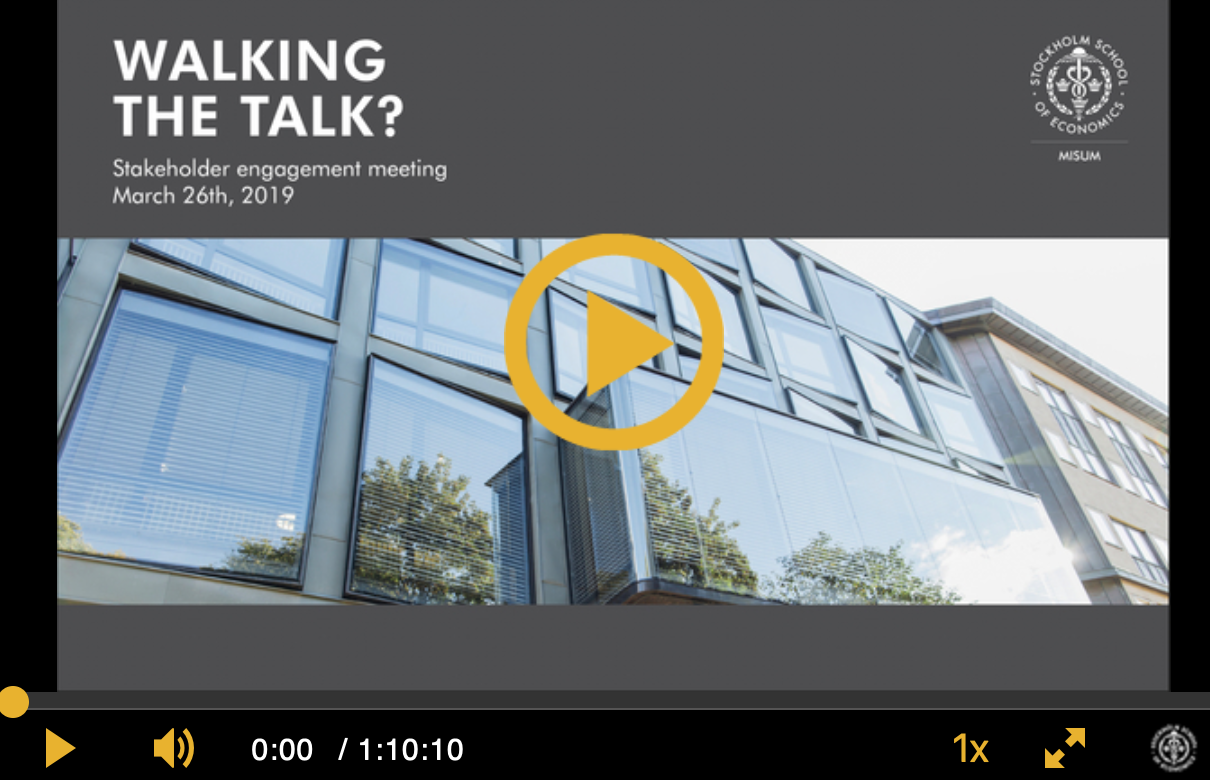Walking the talk 2019: stakeholder meeting
 Winter/spring 2019 we prepared our third biennial Walking the Talk report on sustainability communication by companies listed on the Nasdaq OMX Stockholm Large Cap index. Before we started coding the sustainability and annual reports we invited stakeholder to engage to discuss the scoring scheme. Our plan was to retain the previous KPIs, but potentially also to add a few new KPIs to reflect changes in the sustainability field since 2015.
Winter/spring 2019 we prepared our third biennial Walking the Talk report on sustainability communication by companies listed on the Nasdaq OMX Stockholm Large Cap index. Before we started coding the sustainability and annual reports we invited stakeholder to engage to discuss the scoring scheme. Our plan was to retain the previous KPIs, but potentially also to add a few new KPIs to reflect changes in the sustainability field since 2015.
Watch a video from the event here.
Summery from the meeting by Johanna Klatt, Misum:
Walking further?
Does the systematic investigation of CSR and management practices at SSE actually have an impact on practice? On March 26, Misum’s Lin Lerpold, Associate Professor at the Department of Marketing and Strategy, invited representatives of the Nasdaq OMX Stockholm Large Cap index companies to discuss the upcoming third edition of the “Walking the Talk” report: Supported by SSE students, she assesses the coherence between Corporate Social Responsibility “talks” (i.e. aspirations) and “walks” (i.e. practices and measures) of the big multinationals since 2015.
The first two reports provoked a huge response from both business and the public, particularly due to the fact that the majority rather “talks” than “walks” (link reports). Now the responsible managers have shown big interest how their CSR activities can be improved – and by which indicators this is evaluated. Lin Lerpold presented the analysis criteria and procedure, and discussed the implication for corporate sustainability assessments and possible enhancements with 21 business stakeholders (e. g….?).
The most prominent points for thorough sustainability management, and causes for rather low “walking” scores in the past, were integrated reporting routines, the embeddedness of sustainability principles in strategic decision-making and leadership and measurable targets that are followed-up on. Although companies seem to be more concerned – which already manifested in slight improvements in their performance between 2015 and 2017, there are obviously difficulties to implement coherent CSR.
What are the problems? Many participants alleged that they report separately on their economic/financial and their sustainability performance due to different “vocabulary” and audiences, not because the latter is not seen as important. Besides this, one participant stated that sustainability targets are included in the corporate strategy, but the “strategic circle” of companies rarely goes beyond a few-year-period, so there was no capacity to consider issues that are more long-term in their nature.
The lively discussion between the professor and the managers underlined the gap between research insights and business practices – one side with an holistic and universal perspective on sustainability, the other oriented on the adaption of this broad concept to the logic of management and different stakeholders, which was mirrored by questions like: “Why does the analysis not account for sector-specific emission targets?” or “What are the benefits of integrated reporting and long-term goals?”
“Companies have to think about what sustainability really means”, Lerpold stressed. Currently most CSR disclosures lack measurable targets and strategic commitment at all, but even if this was the case one has to ask about the sustainability of the whole business model as next step – how to evaluate a more socially and environmentally friendly supply chain within the logic of fast fashion, for instance?
Regarding the near future and practical next steps, the application of frameworks like the scheme of the Global Reporting Initiative (GRI) or the United Nation’s Sustainable Development Goals (SDGs) could provide guidance. Many corporate representatives attested a lack of concrete materiality issues here, which led back to the necessity of a more elaborate strategic process, e. g. the review of the more detailed (169) sub-targets behind the SDGs. “The goal with ‘Walking the talk’ is not that companies only report along the indicators we chose”, emphasized Lin Lerpold, but rather how to assess if there are tangible sustainability targets and serious measures that can be built upon.
The results of the third edition are expected in August, and a continuous stakeholder dialogue is envisioned for the future process to bring scientific and business benchmarks closer together.